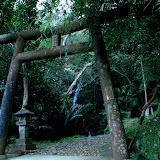 |
| Zooming in from the Shinugu Shrine Ruins |
View Map It! Okinawa in a larger map
 |
| A View & the Shinugu Shrine Ruins |
GPS
| Latitude | Longitude |
| N 26 22.267 | E 127 58.863 |
A View and The Shinugu Shrine Ruins
A small plateau lies on top of Miyagi Island and on its eastern edge lies a great viewpoint looking further down the island and parts of Ikei Jima to its north. The zoomed image you see above is of a park down below near the Nagusuku Udun. The viewpoint is collocated on the Shinugu Shrine Ruins. The ruins were first discovered by Shinjun Tawada and was named in 1933, the Shinugu Shrine Shellmound. Today, Mr. Shinjun Tawada is considered to be the father of Okinawan Archeology. Further excavation would lead to discoveries of artifacts “made from clay, stone, shells, and bones”. Also, the excavation would lead to evidence (forty pieces of artifacts) that would seem to indicate that the villagers had “in-ground living quarters”.
There is one point of clarification that needs to be settled. According the translated sign in English, it is said that these “ruins are now known to be the largest village in Okinawa”. Perhaps it is meant that these are the largest ruins of its kind found on Okinawa. The term “village” has various conceptual meanings in terms of size and composition. Today, there is not much to see of these ruins; just a few stone markers placed by the town. It is difficult to get the full scope and size of the area. According to the translation, the ruins were “returned to the earth where they were found for storage purposes”.
The view on top is worth seeing. It gives you an idea of the complex landscape the Okinawans long ago on Miyagi Island had to endure for many years. The location is not far from the Yan Spring down below. It is just a short drive up as you traverse the hillside. To see other scenic views from this area, please click on the photo album above or click here.
Source & Translation. Information provided by the Uruma City Board of Education.
Other places of interest nearby. The Nagusuku Udun, The Yan Spring.







